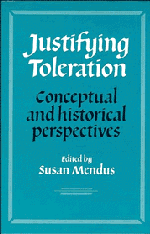Book contents
- Frontmatter
- Contents
- Preface
- Introduction
- 1 Scepticism and toleration in the seventeenth century
- 2 A more tolerant Hobbes?
- 3 Locke: toleration and the rationality of persecution
- 4 Toleration and Mill's liberty of thought and discussion
- 5 Rousseau and respect for others
- 6 The intolerable
- 7 Autonomy, toleration, and the harm principle
- 8 Friendship, truth, and politics: Hannah Arendt and toleration
- 9 Dissent, toleration, and civil rights in communism
- 10 Liberalism, marxism, and tolerance
- 11 Socialism and toleration
- Index
3 - Locke: toleration and the rationality of persecution
Published online by Cambridge University Press: 20 May 2010
- Frontmatter
- Contents
- Preface
- Introduction
- 1 Scepticism and toleration in the seventeenth century
- 2 A more tolerant Hobbes?
- 3 Locke: toleration and the rationality of persecution
- 4 Toleration and Mill's liberty of thought and discussion
- 5 Rousseau and respect for others
- 6 The intolerable
- 7 Autonomy, toleration, and the harm principle
- 8 Friendship, truth, and politics: Hannah Arendt and toleration
- 9 Dissent, toleration, and civil rights in communism
- 10 Liberalism, marxism, and tolerance
- 11 Socialism and toleration
- Index
Summary
This is a paper about John Locke's argument for toleration, or, more accurately, it is a paper about the main line of argument which appears in Locke's work A Letter on Toleration. It is not intended – as so many papers on Locke's political philosophy are these days– as a historical analysis of his position. I am not going to say very much at all about the development (in some ways the quite remarkable development) of Locke's views on the subject, or about the contemporary debate on religious toleration in which Locke, first as an academic then as a political agitator, was involved, or about the historical circumstances of the Letter's composition. No doubt these are worthy subjects for a paper, but not, I think, for a volume devoted to toleration as an issue in modern political philosophy. Rather, I want to consider the Lockian case as a political argument – that is as a practical intellectual resource that can be abstracted from the antiquity of its context and deployed in the modern debate about liberal theories of justice and political morality. To put it bluntly, I want to consider whether Locke's case is worth anything as an argument which might dissuade someone here and now from actions of intolerance and persecution.
There is a further somewhat more abstract reason for examining the Lockian argument. In its content and structure the Lockian case is quite different from the more familiar and more commonly cited arguments of John Stuart Mill.
- Type
- Chapter
- Information
- Justifying TolerationConceptual and Historical Perspectives, pp. 61 - 86Publisher: Cambridge University PressPrint publication year: 1988
- 32
- Cited by



